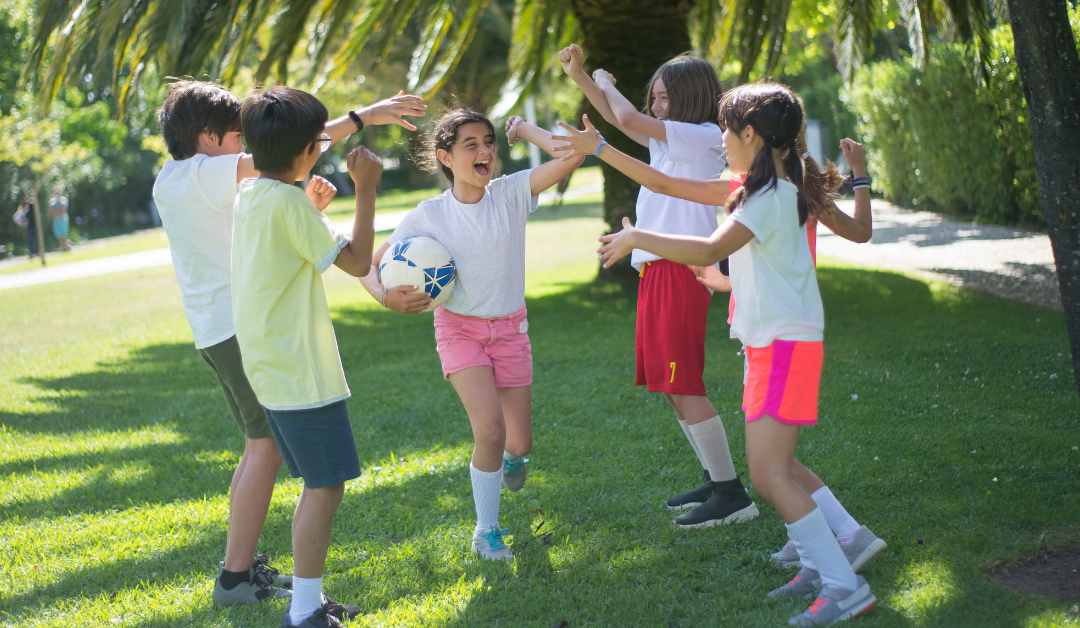Developing strong social skills in children is vital for them as they navigate the world and form meaningful connections with others. Social skills enable them to communicate effectively, empathize with others, build friendships, and navigate social situations with confidence.
This blog explores practical strategies and activities to help promote social skills in children, laying the foundation for positive social interactions and healthy relationships:
- Encourage Cooperative Play: Cooperative play provides opportunities for children to work together towards a common goal, fostering teamwork, communication, and problem-solving skills. Encourage group activities, such as building projects, team sports, or board games, where children can learn to take turns, share, listen to others, and collaborate.
- Model Positive Social Behavior: Children learn by observing and imitating the behavior of adults and peers. Model positive social behavior by demonstrating kindness, empathy, and respect in your interactions. Encourage active listening, good manners, and appropriate conflict resolution techniques. Your actions will serve as a powerful example for children to emulate.
- Teach Empathy and Perspective-Taking: Empathy is a crucial skill for building meaningful relationships. Encourage children to consider others’ feelings and perspectives by asking questions like “How do you think they feel?” or “What would you do in their shoes?” Engage in discussions about emotions and encourage them to express empathy towards others.
- Practice Active Listening: Active listening is a fundamental social skill. Teach children to give their full attention to others when they are speaking, maintain eye contact, and respond appropriately. Encourage them to ask follow-up questions, paraphrase, and validate others’ feelings and experiences.
- Foster Communication Skills: Effective communication is essential for successful social interactions. Encourage children to express their thoughts, feelings, and needs clearly and respectfully. Provide opportunities for them to engage in conversations, share ideas, and actively participate in group discussions. Offer guidance on using appropriate body language and non-verbal cues.
- Role-Playing and Problem-Solving: Engage children in role-playing scenarios that simulate real-life social situations. This can help them practice problem-solving, conflict resolution, and assertiveness skills. Guide them through different scenarios and encourage them to think about multiple solutions and consider the potential consequences of their actions.
- Cultivate Social Awareness: Help children develop an understanding of social cues and norms. Teach them to recognize facial expressions, body language, and tone of voice to interpret others’ emotions and intentions. Discuss appropriate behavior in various settings, such as school, family gatherings, or public spaces.
- Encourage Social Opportunities: Provide ample opportunities for children to interact with peers in structured and unstructured settings. Arrange playdates, encourage participation in group activities, clubs, or team sports. These experiences foster socialization, teamwork, and the development of friendships.
- Build Confidence and Self-Esteem: Promote a positive self-image and self-confidence in children. Encourage their unique strengths, celebrate their achievements, and provide constructive feedback. When children feel good about themselves, they are more likely to engage socially with others and take healthy risks in social situations.
- Foster Inclusion and Acceptance: Emphasize the value of diversity and inclusion. Teach children to appreciate differences and embrace others’ unique qualities and backgrounds. Encourage them to be inclusive, welcoming, and understanding of others’ perspectives and experiences.
In conclusion, promoting social skills in children lays the foundation for healthy relationships, effective communication, and emotional well-being. By incorporating activities that encourage cooperative play, empathy, active listening, and problem-solving, we can help children navigate social interactions with confidence and build meaningful connections.
Nurturing social skills not only benefits the child’s immediate social experiences but also contributes to their overall personal and professional growth in the future.
Contact us for support in helping children’s mental health in Houston, TX & Dayton County
Children’s Mental Health Services in Texas
Accepting Medicaid & Private Insurance
Reach out
Phone Number: 1-855-AOC-6100
24 Hours Crisis Line: 832-934-7770
Hours: Monday-Friday 9-5PM
Location: Houston & San Antonio areas
Houston Email: admin@aocoutreachservices.com
San Antonio Email: admin.sa@aocoutreachservices.com
Insurance Accepted
Medicaid: Texas Children Health Plan, Superior Health Plan, Molina Healthcare, United Healthcare
Private: Aetna, Blue Cross Blue Shield, & Cigna
Offices
Houston Office: 6671 Southwest Freeway, Suite 675, Houston, Texas, 77074
San Antonio Mailing Address: 45 Northeast Loop 410 Suite 207, San Antonio, Texas 78216
Follow Us
learn more
Start Services


